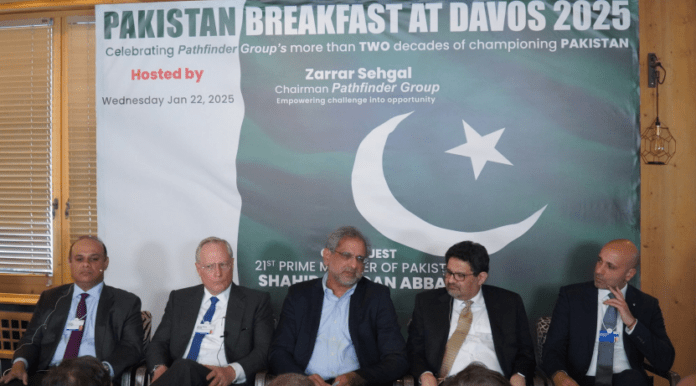
The 21st Pakistan Breakfast at Davos, hosted by the Pathfinder Group, during the World Economic Forum Annual Meeting, was held on 22nd January 2025. It was moderated by the Chairman of Pathfinder Group, Zarrar Sehgal.
Zarrar Sehgal, Moderator & Chairman, Pathfinder Group
I thank you all for attending the 21st Pakistan Breakfast at Davos, I extend a warm welcome to all our guests. A special welcome to our chief guest, Shahid Khaqan Abbasi, we are truly honoured to have you with us. We will begin with a few words from Alexandre Raffoul, a member of the Executive Committee and Head of Strategy at the World Economic Forum.
Alexandre Raffoul Member of Executive Committee, WEF
Thank you, Zarrar Sehgal. It’s truly an honour to be back here and to continue building on the great legacy that the World Economic Forum has established with Pakistan. Over the past couple of decades, we’ve had the privilege of working closely with Ikram Sehgal and his team. It has been a long journey to reach this point. This breakfast and this annual meeting come at a critical time for the global economy. In this era of fragmentation, we are all witnessing its ripple effects, and 2025 promises to be a particularly eventful year.
Honourable Prime Minister, it is a pleasure to see you here and to continue strengthening this legacy together. Our collaboration with Pakistan extends throughout the year. Earlier this year, Prime Minister Shahbaz Sharif was a special guest at our meeting in Saudi Arabia, which focused on cross-regional collaboration.
At the Forum, as many of you know, we are the International Organization for Public-Private Partnerships. We firmly believe that no single sector can address the world’s most significant challenges alone. Pakistan is a vital part of the puzzle we are working to solve. Through our 10 Centers of Excellence, one of which focuses on Nature and Climate, we address these global issues. I’m proud to note that the Pathfinder Group has been actively engaged with the Edison Alliance, which aims to connect over one billion unconnected people, not just to the grid, but also to telecom, agritech, healthtech, and other transformative sectors. Building on this legacy, we look forward to continuing our collaboration and supporting Pakistan in raising its global profile. At the same time, we strive to ensure that our platform re mains one of true diversity and inclusion. It’s a great pleasure to collaborate, and I look forward to the discussions ahead.
Zarrar Sehgal, Moderator
Thank you, Alex. The World Economic Forum has always been a wonderful partner to us, and we truly appreciate all your work. Please convey our regards to Mirek Dušek, we miss him and hope to see him next time.
I’d like to introduce Miftah Ismail, who has served as Pakistan’s Finance Minister twice. He is a prominent member of the business community and a former representative of the IMF. Many of the economic plans currently driving progress in Pakistan are the result of his dedication and hard work. Miftah Ismail, thank you for being here. We are truly honoured to have you with us.
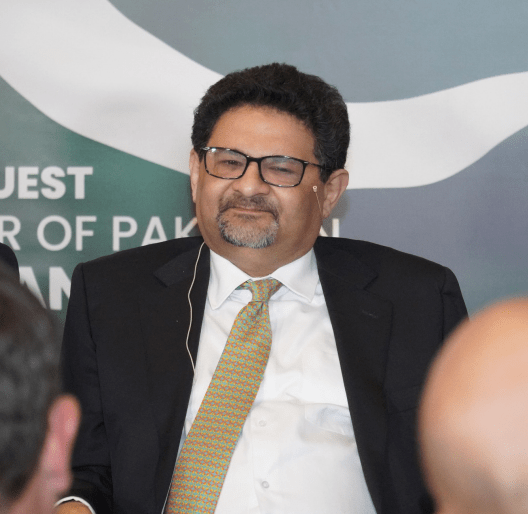
Miftah Ismail Former Finance Minister of Pakistan
Thank you, Zarrar, and thank you to the Pathfinder Group for inviting me and allowing me to speak here. The population issue in Pakistan is growing very rapidly. In one way, it’s good, it’s an asset. The growing young population is an asset, as China, Japan, and other countries are finding out. But it’s only an asset if you prepare them. We still have about 8 million babies born every year, and the yearly increase in our population is 6.5 million. Channelling these children into productive members of society could turn Pakistan’s population into an asset.
However, so far, no government has been able to achieve this. It is not that any particular government, whether under Shahbaz Sharif, Shahid Khaqan Abbasi, or anyone else, has been poor in their efforts. Rather, it is the system itself that is preventing us from succeeding. What Pakistan needs is a fundamental change. We talk about reforms, but we need to essentially change the direction of our country.
We started a political party after realizing that the existing parties had no interest in real reforms or the understanding needed to make changes. We need to decrease the size of the government and shake up its structure. We should consider utilizing the private sector more effectively. For example, take Pakistan Airlines, which incurs losses of 100 billion rupees each year. There has been ongoing discussion about privatization, and a few years ago, I mentioned that if anyone was interested, we would sell it for just one rupee. People questioned, “Why would anyone pay just one rupee?”
However, as the Finance Minister, I understood that the liabilities far exceeded the assets, making it unlikely for anyone to be willing to buy it. The same logic applies to electricity distribution companies; it is not feasible to have such high transmission and distribution losses while the service remains government-operated. If we privatized electricity, oil, and gas distribution companies, there would be no need for the government to run petrol pumps. The government should focus on law enforcement and the courts while minimizing its size and involving the private sector more.
For education, the government should provide vouchers to low-income children so they can attend any school they choose. However, given the extreme inequality in Pakistan, a serious social justice plan is necessary. This should include direct cash transfers to the poorest 20-30% of the population to improve their standard of living, as it’s difficult to educate a child who is going without meals. Initiatives like school breakfast programs could also be part of this plan. All of this is within our reach.
We are on the wrong side of the Laffer curve. Corporate taxes are now at 61%, which makes no sense. We can reduce taxes, reduce the size of the government, implement cash transfers, and encourage the private sector. The fact of the matter is that the government in Pakistan simply doesn’t work. I don’t care about the rest of the world, but the government in Pakistan is a failure. So we need to reduce its size. That’s the vision for Pakistan, and I hope that one day we’ll make these changes so that we can finally take off. Thank you.
Zarrar Sehgal, Moderator
Thank you, Miftah Ismail. I fully agree that the need for structural reform should be a top priority for any government, whether current or future. Now, I’d like to introduce Ross Perot Jr., Chairman of the Perot Group of Companies. He is known as the first man to fly around the world in a helicopter, a remarkable achievement. But more importantly, he is a close friend of ours, both to our families and personally to my father and me. Ross, we deeply appreciate your presence here. Your unwavering support for Pakistan and your attendance today truly reflect your care.
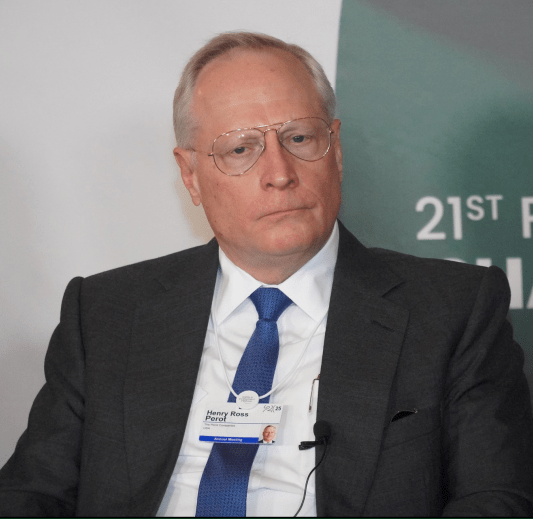
Ross Perot Jr. Chairman, The Perot Group
Thank you, and it’s truly an honour to be here. I believe I’ve attended nearly all of the 20 Pakistani Breakfasts at Davos over the years. I’ve been friends with Ikram Sehgal for a long time, and if you’ve been to this breakfast before, you know I always like to talk about what an excellent helicopter pilot he is. We’ve flown together several times, he’s even visited me in Texas, and we’ve taken to the skies there.
I think it’s been about 10 to 15 years since he last flew a helicopter, but when I put him in one again, he hadn’t forgotten a thing. Truly, a natural helicopter pilot from Pakistan! It’s an honour to be part of this event. I’ve always believed that the key to strong relationships between Pakistan and the United States lies in business-to-business diplomacy. Building connections between our business communities and fostering collaboration are essential.
When businesses work together, we can bring prosperity to Pakistan and provide opportunities for the people who need them most creating jobs and fostering hope. As Vice Chair of the United States Chamber of Commerce, I’ve had the privilege of leading delegations worldwide to promote American businesses and build strong relationships across the global business community. Mr Prime Minister, when you visit Washington, I hope you’ll come to the United States Chamber of Commerce.
Bring prominent Pakistani business leaders to meet their counterparts in the U.S., and let’s explore ways to deepen these partnerships. I’m optimistic about the future. Over the weekend, I attended the inauguration, and I’m encouraged by the new administration’s strong forward-thinking, and determined start. I believe President Trump will focus on promoting American businesses globally and strengthening relationships with key countries like Pakistan.
Looking ahead, I see optimism and opportunity. Communication is essential we must keep the dialogue open, continue to understand each other, and prioritize building stronger business relationships. Thank you very much.
Zarrar Sehgal, Moderator
Do you think the change in administration in Washington, D.C., would bring about a change in relations between the two countries?
Ross Perot Jr. Chairman, The Perot Group
I think we have a very high-energy president, and it’s amazing to see how he operates. He only sleeps about four hours a night, yet he’s constantly on the go. During the transition, I was assisting in finding great talent to join the administration. What’s incredible is hearing from my friends who are working with him they get a message at midnight, and then another one at 4:30 in the morning! He’s relentless.
He knows he only has four years to make an impact, and he wants to leave behind a strong legacy. As a businessman, he’s pragmatic and focused on solving problems. Coming from the business world rather than a career in politics, he approaches challenges differently he’s results-oriented and keen to fix issues quickly. Just look at the 100 executive orders he has already issued. He’s sending a very strong message about what he wants to accomplish. For Pakistan, the key will be ensuring that your diplomats maintain close and active communication with their counterparts in the U.S. It’s important to have an aggressive and proactive approach in building the relationship.
From my observations, President Trump values directness. He doesn’t like excessive bureaucracy and prefers when people get straight to the point. If you can get in front of him, present a clear, credible case, and explain what Pakistan needs, he’s the type of leader who takes decisions on the spot rather than waiting for committees or prolonged processes. This could be a very positive opportunity for Pakistan, but Pakistan has to take the first step and ensure that its priorities and agenda are clearly communicated to the administration.
Zarrar Sehgal, Moderator
I’d like to introduce our chief guest, Shahid Khaqan Abbasi, former Prime Minister and leader of his party. He has had a long and distinguished career in both business and politics. Among his many achievements, he founded Airblue and has also served in the government in various capacities, including as the head of the Petroleum Ministry. Mr Abbasi is often commended for qualities that are all too rare in politics: his honesty and forthrightness. We are truly honoured to have you, sir.
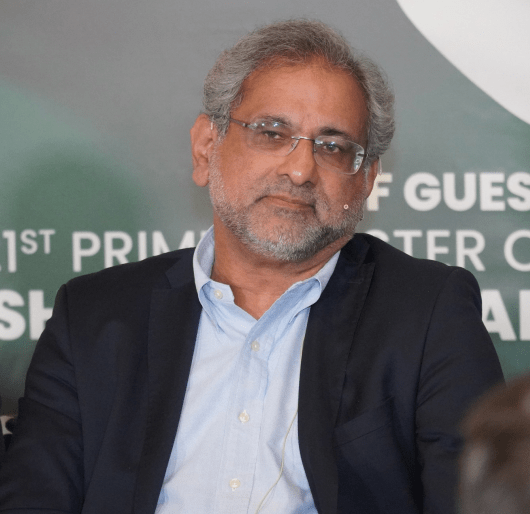
Shahid Khaqan Abbasi 21st Prime Minister of Pakistan
It’s a real privilege to be here, and I’m grateful to Ikram Sehgal and the Pathfinder Group for the opportunity. Normally, you would expect a senior government official to be here, so it’s a significant change to have two people here who are not only in opposition but also opposed to the opposition itself. It’s a unique situation. When Mr Sehgal invited me, I wondered what I would talk about, because when we appear in the media, we often talk about what’s wrong with Pakistan, how poorly the government is performing, and how the country is struggling.
But this is not the place to focus on that. Instead, we should talk about where the potential lies, and where the hopes are. I was told yesterday that potential has always been there, but it needs to be realized and exploited; otherwise, it remains just potential. I believe this has been Pakistan’s story. However, today, I’d like to talk about the reality of Pakistan and, more importantly, the fixes we need. I’m also from a mountainous area in Pakistan, and as I was coming here, I looked up some data that I hadn’t seen before, and it’s truly amazing.
Davos is the highest town in Europe, at 1,600 meters. My hometown, Murree, is at 2,400 meters. Mont Blanc, not far from here, stands at 4,800 meters, making it the highest peak in Europe. Does anyone have an idea how many mountains in Pakistan are over 5,000 meters, higher than Mont Blanc? Pakistan has 4,555 mountains over 6,000 meters. The number of mountains above 5000 meters, which is higher than Mont Blanc, is not even counted there are countless peaks. So just imagine the potential. That’s the reality of Pakistan. Wherever you go, you can see that potential. We just have to realize it, and I think that’s where we’ve been failing.
Pakistan has faced a failure of leadership, both politically and militarily. The need for the rule of law and the supremacy of the Constitution is critical for the nation’s progress; without them, economic prosperity is difficult to achieve. Recent award recipients have highlighted that countries thriving since colonial times have embraced the rule of law. This is the direction Pakistan must pursue, as its current political system struggles to address pressing challenges.
We have three major parties, all in power, with each holding either a provincial or federal government position. Yet, there is little improvement. If you look at the U.S. elections, the European elections, or even China, they all talk about reform, continuous reform. Unfortunately, Pakistan does not talk about reform. Every system in Pakistan needs immense reform.
Many people abroad may not realize the diversity in Pakistan. As I travel, I encounter various cultures, ethnicities, and languages, highlighting that Pakistan is not a homogeneous nation. This diversity complicates the political reform process. Pakistan has 7,000 glaciers, the highest number outside the polar regions, and currently experiences the fastest glacier melt in the world. While other nations have advanced, Pakistan suffers the consequences of alternating floods and droughts. Global warming and environmental challenges significantly impact our economy and society and the world must tackle these issues together.
Administratively, Pakistan has always had disparity between its provinces. One province has two-thirds of the population, while another covers two-thirds of the land mass. There is always apprehension about the majority province controlling the country. The solution we’ve always advocated is to either break up Pakistan into new provinces or devolve power to a district level. Our solution has always been to devolve power from the federal government to the provincial governments.
Now, I believe it’s time to devolve it further to the district level so they can compete with financial authority ensuring quality police forces, good education, and healthcare at the local level. The first time I came to Davos was in 1991 with the then Prime Minister. At that time, Pakistan was the darling of the Davos Forum because we had a very successful start to our privatization program. We were the first country in the world to privatize a financial institution when we sold a bank. This transaction took just four months from start to handover, making it a highly successful deal. Back then, the government controlled almost everything, 450 industries and about 70 corporations, including cement, fertilizer, telecom the government owned it. Today, we own nothing. It’s been a very successful privatization story, but it’s not often told.
I came back here in 2018 as Prime Minister, and there was an interesting moment that year. The star player at Davos was Carlos Ghosn, the head of Renault and Nissan. At a roundtable in Davos, which is where you bid to sit with influential figures, Carlos Ghosn received over 90 bids to sit at his table, which had just 10 seats. And guess what? He wanted to meet Pakistan. He saw the potential in Pakistan, and so he came to see us. He even planned to bring Renault to Pakistan and build a Datsun plant here. Unfortunately, both of these plans didn’t materialize because of political changes and government turnover, which stifled growth. It’s a story that reflects the potential Pakistan has but also shows the difficulty of realizing that potential.
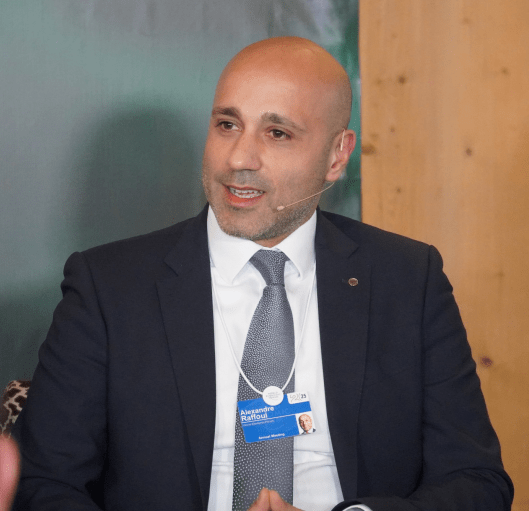
Pakistan has many pluses. We have a passionate diaspora that sustains the country, sending home money equal to our total exports. If you count informal channels, it’s probably much larger. This passionate diaspora, which is now in its third generation, has not diluted much in its connection with Pakistan. They are similar to the Irish in the U.S. who are passionate about their homeland, even after hundreds of years.
However, the problem is that they don’t invest much in Pakistan, primarily in real estate, which has also faced challenges due to exchange rate fluctuations. Pakistan’s greatest potential lies in its youth, with two thirds of the population under 30, one of the largest youth demographics globally. While many countries face ageing populations, Pakistan has an opportunity to harness the energy and ambition of its young people. However, political leaders need to provide them with the necessary education, opportunities, and business prospects.
This belief is why my colleagues and I chose to distance ourselves from the current political parties, which we feel lack the capacity and integrity to address the nation’s issues. Nevertheless, I remain optimistic that, if empowered, the youth can drive meaningful change. Pakistan is home to the world’s oldest civilization, the second-highest and third-highest peaks, the deepest seaport, some of the largest salt mines, and one of the largest water basins. We also have the highest paved road in the world, the Karakoram Highway. This is Pakistan, and I’ve only touched on a few things. We’re also home to the youngest Nobel laureate and a double Oscar winner, who is here at the World Economic Forum.
Pakistan doesn’t just have potential—we can talk about the reality today. In many ways, Pakistan is doing extremely well, but we need to address poor governance, structural reforms, and devolution of power.
We’re entering an era where small government is becoming the trend globally. People want smaller governments and larger private sectors.
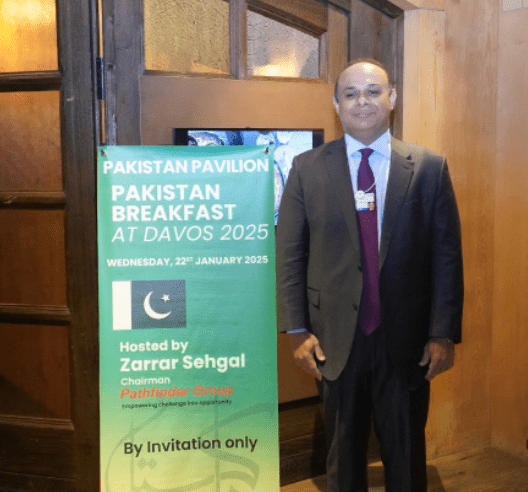
at Morosani Posthotel in Davos
Zarrar Sehgal, Moderator
With that, I’d like to thank everyone for being here, especially the Pathfinder team who worked tirelessly to organize this event. I appreciate all their help. Also, I’d like to thank my father, Ikram Sehgal, who is often called the “Pakistani Schwab.” I suppose that makes me a bit of his shadow, though he’s probably a bit better-looking! Thank you, everyone.
Question & Answer Session
Question: I represent what Shahid Khaqan Abbasi referred to as the Pakistani diaspora, and more specifically, I represent the Pakistani-American diaspora. We have a group of diaspora members who are actively involved in trying to make a change in Pakistan and get the country that we all deserve and dream of. A few months ago, while moderating a seminar at George Washington University, I discussed with a participant from Pakistan the lack of continuity in policy-making and governance in his country. He compared it to India, arguing that despite the perception of the Modi government as “fascist,” India’s economic success stems from its policy continuity. I countered that while continuity is important, legitimacy in government is even more crucial. Without legitimacy, continuity alone doesn’t lead to success; it risks creating a situation similar to Myanmar. So, my question to Shahid Khaqan is: What do you think is the solution to the current political stalemate in Pakistan?
Shahid Khaqan Abbasi 21st Prime Minister of Pakistan
I thought the first question would be, “When will Imran Khan be released?” And the answer to that is that he’s getting a good education in jail. Trust me, I’ve spent three years in jail under different governments, and it’s the best education you can get. You have time to reflect and learn, so for a politician, it’s a great place to be. I hope he learns from his time there.
He made a lot of mistakes when he was in power. The political stalemate today is a very difficult situation; it’s extremely polarized. The fact that Miftah Ismail and I are sitting here instead of government officials shows how hostile things are. The country is divided, and so is the diaspora. The solution lies with leadership. I say this every day on TV: Pakistan is one country, but every day you see politicians on live national TV, whether they are ministers or opposition leaders. It’s so polarized, with each side having a high viewership.
The political, military, and judicial leadership who are all stakeholders beyond the Constitution in how our country is governed need to sit down and chart a way forward. How will the country be run? It cannot continue as it is. Either we honour the Constitution or we do not. If there are issues with the Constitution, let’s all sit down and amend it, but there has to be a clear system of government in place.
What we need is radical reform, and that requires consensus. No single party can do it alone. They need to work together, sit down, and agree on a clear agenda. That’s the reality of where Pakistan should be headed.
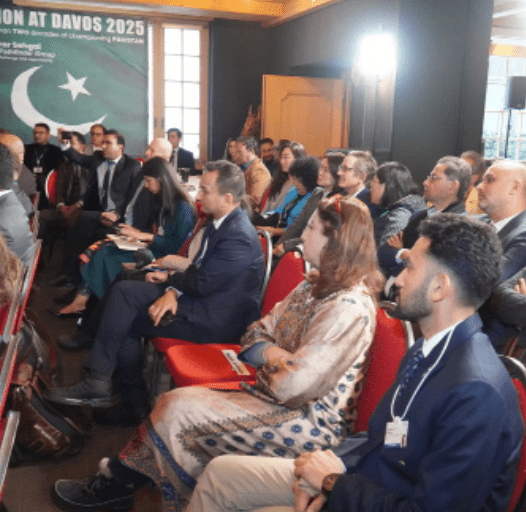
Miftah Ismail Former Finance Minister of Pakistan
You’re right that this government does not have the legitimacy it needs to govern effectively, but we must put this in context. A few days ago, friends from PTI came to meet Shahid Khaqan Abbasi and asked us to join something called the “Movement to Protect the Constitution.” But let’s look at Imran Khan’s history. When the leaders came to us, they said, “You guys are very good faces; nobody doubts your integrity or intelligence.” But these same people were saying with a straight face that it was Imran Khan who had put both of us in jail. He knew for a fact that his attorney general had told him there was no case against us, but he still decided to keep us in jail because he didn’t want his narrative to get spoiled. So, we need to understand the context of where all this is coming from. Yes, you’re right that these elections were rigged, but let’s not forget that the elections in the 80s were also manipulated. For example, in Mr Abbasi’s constituency, 36,000 votes were cast after 5 PM. I know this for a fact because my election agents were thrown out. So, Imran Khan is not some beacon of hope or a democrat. This is why we have launched our party.
When they came to us and asked if we wanted to meet with Imran Khan, I said, “No, I’ve spent enough time in jail. Thank you very much.” History didn’t start on February 8th or May 9th; history started in 1947, or more effectively in 1953-54 when Ayub Khan asserted himself. Our politics has always been dominated by the military. Imran Khan, from 2010 to 2022, was their favourite. In 2014, he led a protest against all democratic norms with absolutely no reason to do so. This man utilized those situations. So, when he says he hopes he has learned, I remember when we were both in NAB, in solitary confinement in very small rooms for 50 days. I read about 17 books during that time. One of the things I used to do was send Shahid Khaqan books. We were across from each other, and I’d send him books like “The 40 Rules of Love,” while I also sent him books on economics, like Joseph Stiglitz’s books or Abhijit Banerjee’s Poor Economics. But I realized, that if I teach him all the economics, I should send him some romantic novels too! He would send me notes, saying that you learn a lot in jail. But one day I got sick of it and said, “I don’t want to learn anymore in jail, I just want to get out!” When it comes to supporting Imran Khan, I agree that he is the most popular leader in Pakistan and has the biggest political party. But I also ask that those who support him need to be democratic and have integrity, especially financial integrity. Shahid Khaqan Abbasi and I went to jail for that reason, and now we have our political party.
I also want to disagree with him on one point. This is the good thing about our party: when he said that we privatized a lot in 1991 when Shahid Khaqan was the head of privatization, we managed to privatize things in four months. Today, if you go by the book, it takes 462 working days, which means forever in Pakistan. The point is, we’ve created such rules that now you cannot privatize anything in this century. Since 2000, not a single entity has been privatized. So yes, while we may have a few companies, these 15-20 companies represent a major portion of the market value of the Karachi Stock Exchange that’s all.
Question: My name is Sher Bano Jamali, and I am from Balochistan. I am a Global Shaper of the Islamabad Global Shapers Community, which is an initiative of the World Economic Forum. Every year, a youth representative from Pakistan attends Davos, and this year, I am proud to share that there are two youth representatives from Pakistan. However, my question is particularly for Miftah Ismail and Shahid Khaqan Abbasi: How can we restore youth optimism in Pakistan today, especially when we talk about youth being the future of the country? Specifically, as a Baloch woman, I don’t feel represented. The Baloch insurgency and the challenges we face as freelancers, especially with issues like internet outages and political volatility are a reality. Additionally, when we look at declining human development indicators, it’s concerning. So, while there are youth representatives who want to do more, how can we restore optimism within ourselves? How can we become a part of the conversation, especially when we are 65% of Pakistan’s population?
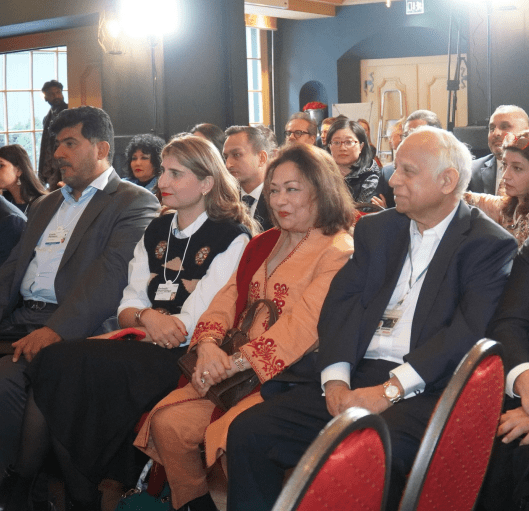
Shahid Khaqan Abbasi 21st Prime Minister of Pakistan
I think you touched on something that is the solution for Pakistan: the youth. The way forward for Pakistan lies in harnessing the potential of the youth, and as I mentioned earlier, the political leadership has largely failed them. That’s one of the most unfortunate aspects of our story. Balochistan, in particular, is a special place. It makes up nearly twothirds of Pakistan’s landmass, has significant mineral potential, a large coastline, and borders two countries. Yet, this potential has not been fully exploited. Today, the youth of Balochistan feel disenfranchised because, historically, the region has been viewed primarily from a security perspective.
I had the opportunity to work with the people and politicians of Balochistan when we were in opposition to Imran Khan, and we built an alliance called the PDM. I was truly impressed by the depth of the real Baloch politicians, such as Hasil Bizenjo and Dr Abdul Malik, who genuinely represent the aspirations of the people. Balochistan is an area that has long been dominated by feudal Sardars, whose word and influence carry a lot of weight.
However, there are individuals like Hasil Bizenjo and Mahmud Khan Achakzai, some of the best politicians Pakistan has, who stand for ideology, have lived by it, and made personal sacrifices. They continue to push for democracy and the rights of their people. For instance, today, no one in Pakistan talks about the Constitution as much as Mahmud Khan Achakzai, who is from Balochistan. Despite the state’s repeated declarations that he is a traitor seven times, if I recall correctly he remains steadfast in his commitment to the Constitution. The youth of Balochistan, like the rest of Pakistan’s youth, simply want their voices to be heard. They want their mandate respected, quality education, jobs, and business opportunities. In Balochistan, honour is especially critical.
The youth there want to be respected and valued, just as any citizen would. These are basic human needs that we have failed to deliver to them. The reality is that Pakistan’s greatest potential lies in its youth. If we work to empower them, they will lead Pakistan into a prosperous and progressive future. Thank you.
Question: We’ve been talking about Pakistan’s potential for years, yet we’ve still not been able to fully capitalize on it. You’ve mentioned the outsized challenges we face and the need for reforms across all sectors. Given that you know the system inside out, what would your playbook be? What are the first two things we should focus on to start bending the curve in the right direction? We understand we can’t solve everything at once, but where should we begin?
Miftah Ismail Former Finance Minister of Pakistan
Let me start by saying a few things. The government of Pakistan has failed to deliver essential services to the people, whether in education, health, water, civil services, and beyond. One of the first things we need to do is decentralize power to the division and district levels. The question of creating new provinces is secondary; the key is empowering local governments. Key areas such as police, water, civil services, sewerage, roads, education, and health should be managed at the local government level.
For example, Balochistan receives more money per capita than any other province, and this year, the province is set to receive about 1,200 billion rupees from the federal government. But corruption in Balochistan is so rampant that the funds are wasted. If we allocated 12,000 rupees per family each month and streamlined the government, it could transform the economy of Balochistan. However, the real resource in Balochistan isn’t just Reko Diq or gas it’s the people themselves. The Baloch and Pashtun communities need to be given authority, autonomy, and power. The government has made significant mistakes in Balochistan over the last 70 years we’ve manipulated elections and alienated our people. The first step is to devolve power to the local level.
Secondly, we need to address structural budget issues, such as the NFC award. We also need to recognize that our most valuable resource is human capital. We don’t have an abundance of natural resources like oil or gas, but we do have people. And that’s what we need to nurture. Developing human resources takes time it’s like mining copper, which takes five years, but developing a human being takes 20 years. If we provide 20 years of good education and decent health services, we’ll see that potential come to life. It’s a long-term commitment, but in 20 to 30 years, we can change the course of Pakistan. For context, in 1990, Pakistan was 50% richer than India on a per capita basis. Today, we’re 40% poorer. This change happened in just 30 to 40 years. If we regain our focus, we can turn things around in the next 20 to 30 years. It’s not an unrealistic timeline, but it requires consistent effort and investment in the future.
Shahid Khaqan Abbasi 21st Prime Minister of Pakistan
Let me start on a lighter note. While we were in jail, there was a small meeting where Miftah Ismail humorously declared himself to be the “Mandela of Pakistan.” Of course, being the pragmatic man that he is, he quickly qualified that statement. After all, he only served 28 weeks, not 28 years! Now, onto your question, which strikes at the heart of the matter: How do we move forward? The truth is, there are no miraculous solutions. We, as a people, tend to believe in miracles, but the reality is different. As I mentioned earlier, the first and foremost step is the rule of law. Without it, nothing else can function properly. If we have the rule of law, we will have political stability. With political stability, we can have consistent policies. And when policies are stable, the economy will grow. A growing economy leads to prosperity for the people, including our youth. So, it all starts with that basic pillar: the rule of law. That is where we need to focus our efforts. Thank you.
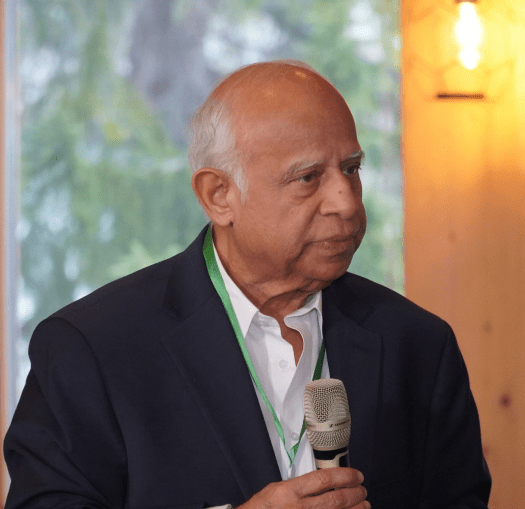
Ikram Sehgal, Co-Chairman Pathfinder Group
First, I would like to start by thanking the World Economic Forum for supporting us for so long Alexandre Raffoul, Aditi, and Andrew, your constant support means a lot. Please convey our gratitude to everyone. The commitment is mutual: we are committed to you, and even at our events, there will always be someone present. Oliver and Kelly will be there as well, which reflects tremendous commitment. Thank you, World Economic Forum. I also want to thank Shahid Khaqan Abbasi and Miftah Ismail. Shahid Khaqan Abbasi and I go back a long way. His father was a friend of mine, but more importantly, he was my commanding officer the bravest I have ever seen in my life during the line in 1971 in the desert when everything else had collapsed. He was the one man who stood out as truly remarkable.
Shahid Khaqan Abbasi himself is someone I remember well from his time as a Member of the Senate, telling me that he never leaves anything lying on his desk. As Prime Minister, he ensured to clear everything before going home, which is a wonderful trait, as I know many prime ministers who leave work undone. Ross Perot Jr., what can one say? Over two decades of friendship, you honour us by always being on stage with us. I particularly appreciate your presence at this time, when Pakistan needs friends like you in Washington. It is important to understand that we don’t want the Indian Ocean to become a Chinese Ocean.
Pakistan plays a crucial role in ensuring engagement from both sides: we wish to be friends with China, maintain good relations with China, and also foster strong ties with the United States and the West. I’d like to thank my son. As I said, I would rather be like him than the other way around. I want to thank my friends from CGS who are here, Ms Nadira Panjwani, and many others in the audience. Muhammad is here. One of my best friends passed away a few months ago. He was always here, and I truly miss him. Imran would have been part of this Pakistan breakfast, and I’m thankful to Muhammad for being here today.
Thanks also to my friends from the chamber, Ying, and everyone else. And I want to thank my staff, who have worked very hard to make all this possible. As you can see, everything has been set up, and I’d like to thank Toni Morosani for being so cooperative in providing this room at the right time. Thank you.




